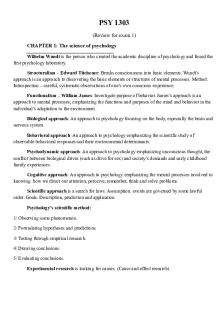Chapter 1 review - Lecture notes 1 PDF

| Title | Chapter 1 review - Lecture notes 1 |
|---|---|
| Author | Tra Nguyen |
| Course | Introduction to Psychology |
| Institution | University of Houston-Downtown |
| Pages | 2 |
| File Size | 83.4 KB |
| File Type | |
| Total Downloads | 15 |
| Total Views | 194 |
Summary
Lecture note for chapter 1....
Description
PSY 1303 (Review for exam 1) CHAPTER 1: The science of psychology Wilhelm Wundt is the person who created the academic discipline of psychology and found the first psychology laboratory. Structuralism – Edward Titchener: Breaks consciousness into basic elements. Wundt’s approach is an approach to discovering the basic elements or structures of mental processes. Method: Introspection – careful, systematic observations of one’s own conscious experience. Functionalism – William James: Investigate purpose of behavior. James’s approach is an approach to mental processes, emphasizing the functions and purposes of the mind and behavior in the individual’s adaptation to the environment. Biological approach: An approach to psychology focusing on the body, especially the brain and nervous system. Behavioral approach: An approach to psychology emphasizing the scientific study of observable behavioral responses and their environmental determinants. Psychodynamic approach: An approach to psychology emphasizing unconscious thought, the conflict between biological drives (such as drive for sex) and society’s demands and early childhood family experiences. Cognitive approach: An approach to psychology emphasizing the mental processes involved in knowing: how we direct our attention, perceive, remember, think and solve problems. Scientific approach is a search for laws. Assumption: events are governed by some lawful order. Goals: Description, prediction and application. Psychology’s scientific method: 1/ Observing some phenomenon. 2/ Formulating hypotheses and predictions. 3/ Testing through empirical research. 4/ Drawing conclusions. 5/ Evaluating conclusions. Experimental research is looking for causes. (Cause and effect research)
Independent variable (IV) = a manipulated experimental factor, the variable that the experimenter changes to see what its effects are. Dependent variable (DV) = variable affected by manipulation or the outcome – the factor that can change in an experiment in response to changes in the independent variable. Experimental group: The participants in an experiment who receive the drug or other treatment under study – that is, those who are exposed to the change that the independent variable represents. Control group: The participants in an experiment who are as much like the experimental group as possible and who are treated in every way like the experimental group except for a manipulated factor, the independent variable. Naturalistic observation is the observation of behavior in a real-world setting and requires an important set of skills. Survey presents a standard set of questions, or items to obtain people’s selfreported attitudes or beliefs about a particular topic. Case study or case history is an in-depth look at a single individual. Correlational research is research that examines the relationships between variables, whose purpose is to examine whether and how 2 variables change together. The degree of relationship between 2 variables is expressed as a numerical value called a correlational coefficient, which is most commonly represented by the letter “r”. The value of a correlation always falls between -1.00 and +1.00. The number of magnitude of the correlation always about the strength of the relationship. The closer the number is to +1 and -1, the stronger the relationship. The sign (+ or -) tells us about the direction of the relationship between the variables. Positive: increases – increases. Negative: increases – decreases. Problem to look out for: Sample size. Sample bias. Placebo effect. Ethics guidelines: Informed consent: All participants must know what their participation will involve and what risks might develop. Confidentially: Researchers are responsible for keeping all of the data they gather on individuals completely confidential and when possible, completely anonymous. Debriefing: After the study has been completed, the researchers should inform the participants of its purpose and the methods they used. Deception: This is an ethical issue that psychologists debate extensively. In some circumstances, telling the participants beforehand what the research study is about substantially alters the participant “Behavior and invalidates the researcher’s data”....
Similar Free PDFs

Review-1 - Lecture notes 1
- 1 Pages

Ch1 Review - Lecture notes Chapter 1
- 17 Pages

Chapter-1 - Lecture notes 1
- 10 Pages

Chapter 1 - Lecture notes 1
- 122 Pages

Chapter 1 - Lecture notes 1
- 3 Pages

Chapter 1 - Lecture notes 1
- 2 Pages

Chapter 1 - Lecture notes 1
- 3 Pages

Chapter 1 - Lecture notes 1
- 7 Pages

Chapter-1 - Lecture notes 1
- 4 Pages

Chapter 1 - Lecture notes 1
- 18 Pages

Chapter 1 - Lecture notes 1
- 3 Pages

Chapter 1 - Lecture notes 1
- 27 Pages

Chapter 1 - Lecture notes 1
- 12 Pages

Chapter 1 - Lecture notes 1
- 22 Pages
Popular Institutions
- Tinajero National High School - Annex
- Politeknik Caltex Riau
- Yokohama City University
- SGT University
- University of Al-Qadisiyah
- Divine Word College of Vigan
- Techniek College Rotterdam
- Universidade de Santiago
- Universiti Teknologi MARA Cawangan Johor Kampus Pasir Gudang
- Poltekkes Kemenkes Yogyakarta
- Baguio City National High School
- Colegio san marcos
- preparatoria uno
- Centro de Bachillerato Tecnológico Industrial y de Servicios No. 107
- Dalian Maritime University
- Quang Trung Secondary School
- Colegio Tecnológico en Informática
- Corporación Regional de Educación Superior
- Grupo CEDVA
- Dar Al Uloom University
- Centro de Estudios Preuniversitarios de la Universidad Nacional de Ingeniería
- 上智大学
- Aakash International School, Nuna Majara
- San Felipe Neri Catholic School
- Kang Chiao International School - New Taipei City
- Misamis Occidental National High School
- Institución Educativa Escuela Normal Juan Ladrilleros
- Kolehiyo ng Pantukan
- Batanes State College
- Instituto Continental
- Sekolah Menengah Kejuruan Kesehatan Kaltara (Tarakan)
- Colegio de La Inmaculada Concepcion - Cebu

